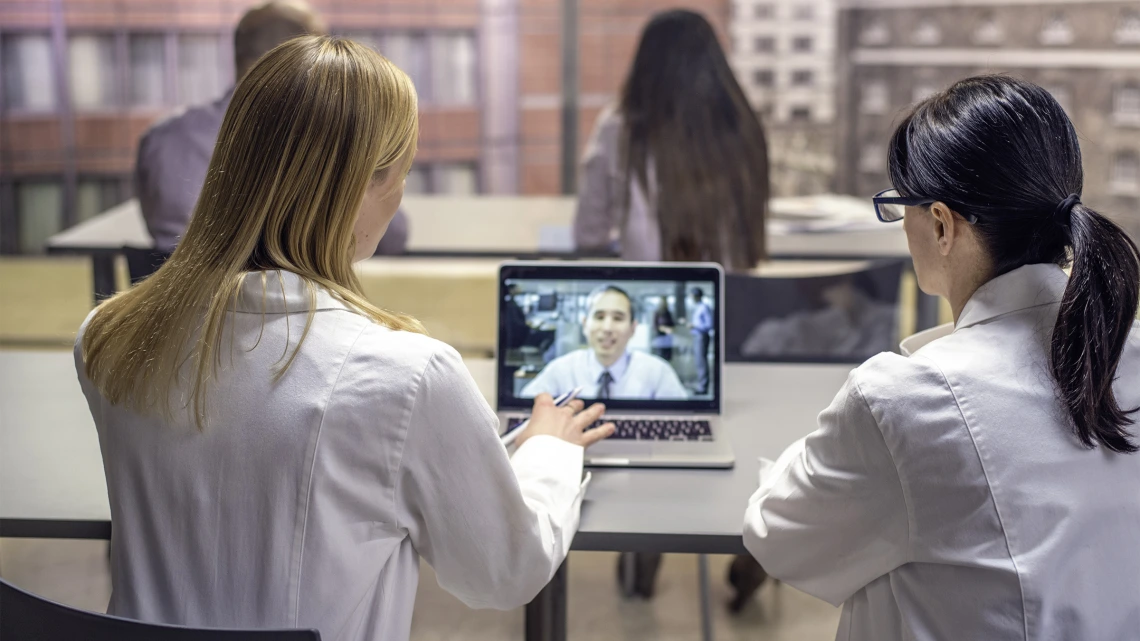Arizona Telemedicine Program Provides Vital Training During Coronavirus Pandemic
Nearly 1,000 participants including nurses, physicians, senior health-care executives, rural hospital CEOs and experts from the information technology sector, were trained on providing care via telemedicine and integrating telemedicine into their practice

Arizona telemedicine program provides vital training during coronavirus pandemic.
Although the technology has been in use for decades, telemedicine is taking on much greater significance as a means to safely deliver health care during the COVID-19 pandemic.

Ronald S. Weinstein, MD, founding director of the Arizona Telemedicine, is pictured in the webinar (top right) with fellow presenters.
“This is the beginning of a new era in telemedicine training,” said Ronald S. Weinstein, MD, a pioneer in the field of telemedicine and founding director of the Arizona Telemedicine Program. “We were thrilled with the exceptionally enthusiastic responses of the attendees.”
The webinar covered topics such as: telemedicine applications; building a successful program; legal, regulatory and payment issues and opportunities; and COVID-19 practical advice and challenges.

An immediate, and urgent market exists for telemedicine training, especially online training. This first webinar is being archived for future reference.
The training was timely, as on March 25, Arizona Governor Doug Ducey issued an Executive Order requiring health insurance companies to expand telemedicine coverage for all services that would normally be covered for an in-person visit. The order helps ensure that Arizonans who may be sick or under quarantine can access care from their homes and avoid potentially risky trips to a health care provider. It remains in effect until the termination of the declared public health emergency.
“Access to health care is crucial at a time like this,” Ducey said. “This order will ensure that Arizonans can access care without having to leave home while freeing up much needed capacity for our health care providers and hospitals. It’s commonsense and helps ensure our most vulnerable continue to have access to care in a way that protects them and public health.”
Since 2000, the Arizona Telemedicine Program has offered six telemedicine training programs each year, provided simultaneously in Tucson and Phoenix. This webinar was previously scheduled as an in-person training event and moved online in response to the COVID-19 pandemic.
“Suddenly, because of COVID-19, telemedicine and telehealth have become mainstream. For example, for the first time, Medicare is reimbursing for urban telemedicine and telemedicine into nursing homes,” Dr. Weinstein said. “Every physician and nurse practitioner will need to bring telemedicine into their practices urgently. Therefore, we need a workforce of professionals and technicians to staff a massive education program that touches every practice in the state, and nationally. An immediate, and urgent market exists for telemedicine training, especially online training.”
The Arizona Telemedicine Program is planning a series of courses, tutorials and on-site training programs for medical practices throughout the region. This first webinar is being archived for future reference, and a “Frequently Asked Questions” page is being added to the program’s website, based on feedback and questions received during the webinar. “Attendees asked dozens of great questions through the ‘chat’ functions. Now we can tally FAQs for future reference. We’re always learning.” Dr. Weinstein said.

